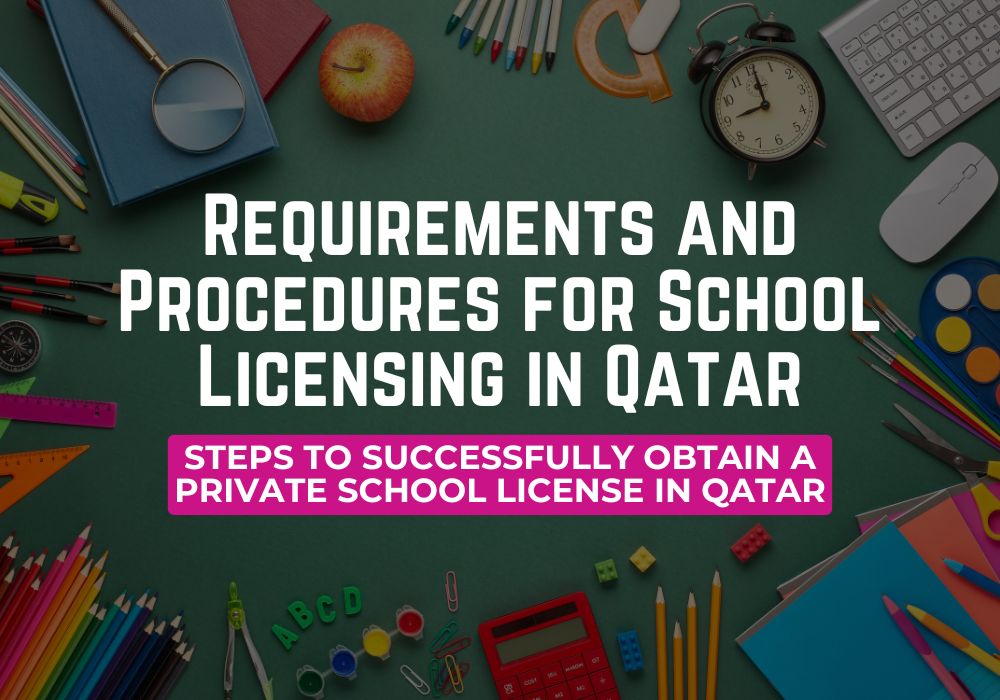Understanding private school licensing in Qatar is crucial for anyone looking to establish an educational institution in this rapidly developing country. The licensing framework in Qatar is meticulously structured to ensure high standards in the education sector, with several government bodies overseeing the process. At the core of this framework are essential requirements that schools must meet to obtain a license. These include infrastructure adequacy, adherence to curriculum standards, teacher qualifications, and demonstration of financial stability. By meeting these criteria, schools not only comply with local regulations but also contribute to the overall quality and effectiveness of education offered in Qatar.
Successfully obtaining a private school license in Qatar involves navigating a detailed application process. This step-by-step procedure encompasses the preparation of important documentation, understanding timelines, and addressing any potential challenges that may arise. By following the established steps and ensuring compliance with all licensing criteria, applicants can facilitate a smoother approval process. It is essential to be aware of common hurdles and to gather insights on how to overcome them, as this can significantly enhance the likelihood of success. Aspiring school operators will find that a well-prepared application not only increases the chances of obtaining a license but also sets a strong foundation for launching a reputable educational institution in Qatar.
Overview of Private School Licensing in Qatar: Key Requirements and Procedures
Private School Licensing Framework in Qatar
Understanding the framework for private school licensing in Qatar is crucial for any entity looking to establish a private educational institution in the country. The licensing process is governed by specific government bodies that ensure compliance with Qatar’s educational standards and regulations.
Main Government Bodies Involved
Ministry of Education and Higher Education (MOEHE): The principal authority responsible for overseeing the licensing process. The MOEHE sets educational policies, evaluates applications, and grants licenses to private schools.
Qatar National School Accreditation (QNSA): This agency helps maintain quality by ensuring that schools adhere to specific accreditation standards. Schools must engage with QNSA for certain aspects of their operations and evaluations.
Municipality Authorities: Involved in ensuring that the school’s infrastructure meets safety and building standards before a license is issued.
Key Requirements for Obtaining a Private School License in Qatar
To obtain a private school license in Qatar, applicants must meet several critical requirements. These requirements ensure that the institution can provide a safe, high-quality educational environment for students.
Infrastructure
Facility Standards: The school facilities must adhere to safety and building codes as regulated by municipal authorities. This includes having well-equipped classrooms, laboratories, libraries, and recreational facilities.
Health and Safety Compliance: The school premises must pass health and safety inspections to ensure a secure environment for students and staff.
Curriculum Standards
– **Alignment with National Education System:** The proposed curriculum should meet the standards set by the MOEHE and be aligned with Qatar’s national educational goals.
– **Diversity and Inclusivity:** The curriculum should cater to a diverse student body, providing inclusive education opportunities for all children regardless of their background.
Teacher Qualifications
– **Professional Credentials:** Teachers must hold relevant educational qualifications and certifications recognized by the MOEHE to ensure the high quality of teaching.
– **Continuous Professional Development:** Schools must have a plan for ongoing teacher training and professional development to keep educators updated with the latest educational practices and methodologies.
Financial Stability
– **Financial Projections:** Applicants must provide detailed financial plans and budgets demonstrating the school’s ability to operate sustainably. This includes start-up costs, operational expenses, and projected revenues.
– **Proof of Funding:** Evidence of adequate financial resources must be submitted to ensure that the school can meet its financial obligations, including staff salaries and facility maintenance.
Meeting these requirements is crucial as they form the foundation of a well-regulated educational environment, ensuring that private schools contribute positively to Qatar’s educational landscape. By adhering to these standards, applicant schools demonstrate their commitment to delivering quality education and upholding the values and goals of the Qatari education system. Understanding and fulfilling these requirements is the first major step toward successfully obtaining a private school license in Qatar.
Significance and Benefits of Private School Licensing
Private school licensing in Qatar plays a vital role in maintaining the country’s educational standards and provides numerous benefits:
Quality Assurance: Licensing ensures that only schools meeting rigorous standards can operate, thus maintaining high educational quality.
Consumer Protection: Parents can be assured that licensed schools meet government-approved safety and educational standards.
Development of the Education Sector: Encourages healthy competition and innovation among schools, fostering an environment for educational advancements and improvements.
These requirements and regulations aim to ensure that private schools operate efficiently and contribute positively to the nation’s educational development, providing students with access to quality education tailored to Qatar’s cultural and academic expectations.
Looking to Start an Educational Institution in Qatar? Contact Us!

Steps to Successfully Obtain a Private School License in Qatar
Step-by-Step Guide on the Application Process
Acquiring a private school license in Qatar is a detailed process that involves several critical steps. Each step requires careful attention to detail and compliance with specific regulations. Here is a comprehensive guide to help you navigate the application process effectively:
1. Preliminary Research and Feasibility Study
- Conduct thorough research to understand the educational landscape in Qatar, focusing on demand, competition, and potential niches in the market.
- Prepare a feasibility study that includes analysis of the target demographic, location, and projected financial performance.
2. Develop a Comprehensive Business Plan
- Draft a business plan that outlines your school’s vision, mission, and strategic objectives.
- Include detailed financial forecasts, marketing strategies, and an operational plan to demonstrate the viability of your school.
3. Secure Appropriate Premises
- Identify suitable premises that meet the infrastructural requirements outlined by the Ministry of Education and Higher Education (MOEHE).
- Ensure the premises comply with safety and accessibility standards.
4. Curriculum and Educational Model Selection
- Choose a curriculum that aligns with Qatar’s educational standards and complements your school’s vision.
- Develop a detailed plan for curriculum delivery, encompassing teaching methodologies and assessment strategies.
5. Application Submission
- Prepare a comprehensive application dossier, including all necessary documents such as the business plan, feasibility study, curriculum design, and proof of premises.
- Submit the application to the MOEHE, ensuring all information is accurate and meets the outlined requirements.
6. Review and Assessment
- The MOEHE will review your application and may request additional information or clarifications.
- Be prepared for potential site visits and assessments by ministry officials to verify compliance with infrastructure and educational standards.
7. Licensing Fees and Financial Documentation
- Pay the required licensing fees, as specified by the MOEHE.
- Provide financial statements or guarantees to demonstrate the financial stability of your institution.
8. Final Approval and License Issuance
- Once your application is approved, you will receive the private school license, allowing you to operate legally in Qatar.
- Ensure continual compliance with educational and operational standards to maintain your license.
Insights into Common Challenges and Tips for Ensuring Compliance
While navigating the licensing process, aspiring school operators in Qatar may encounter several obstacles. Here are some common challenges and tips to help streamline your journey:
Compliance with Infrastructure Standards
Infrastructure compliance is often a significant hurdle. Ensure your premises meet all safety and accessibility criteria, and seek early consultation with experts to avoid costly adjustments later.
Alignment with Curriculum Standards
Developing a curriculum that meets MOEHE standards can be challenging. Engage with educational specialists to ensure your curriculum plan is robust, comprehensive, and appealing to the target market.
Administrative Delays
The approval process can be prolonged due to administrative reviews. To prevent delays, ensure that all documentation is thorough and error-free and promptly address any inquiries from the MOEHE.
Financial and Compliance Checks
Financial scrutiny is stringent, requiring assurances of financial viability. Maintain transparent and organized financial records and consider engaging with financial consultants to reinforce your financial strategies.
Networking and Local Insights
Build a network with local educators and institutions to gather insights and advice. Local partnerships can offer valuable support and guidance through the licensing process.
By understanding and preparing for these challenges, you can better navigate the application process for private school licensing in Qatar, ensuring a smoother path to success.
Securing a private school license in Qatar involves meticulous planning and adherence to regulatory frameworks. Following these outlined steps and insights will enhance your chances of obtaining approval, allowing you to contribute to Qatar’s vibrant educational landscape.
Conclusion
In conclusion, understanding the private school licensing process in Qatar is crucial for anyone looking to establish a reputable educational institution in the country. The licensing framework involves several critical components managed by key government bodies, ensuring that schools meet high standards in terms of infrastructure, curriculum, teacher qualifications, and financial stability. The clear and structured steps outlined in the application process guide potential school founders in gathering the necessary documentation and adhering to stipulated timelines, ultimately facilitating a smoother approval experience.
Moreover, being aware of common challenges and actively working towards compliance with licensing criteria can significantly enhance the likelihood of success. This thorough understanding of the system not only aids in meeting legal and educational standards but also serves as a foundation for providing quality education.
The significance of private school licensing in Qatar extends beyond regulatory compliance; it plays a vital role in maintaining educational excellence and fostering an environment conducive to learning. For prospective school operators, obtaining a license in Qatar means contributing to the country’s educational landscape, offering diverse learning experiences, and playing a part in the nation’s development. As such, following the guidelines and staying informed about the nuances of the licensing procedure is essential for anyone committed to offering esteemed educational opportunities in Qatar.
Looking to Start an Educational Institution in Qatar? Contact Us!






